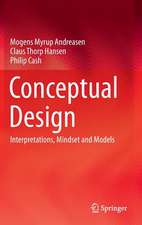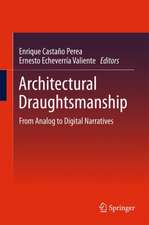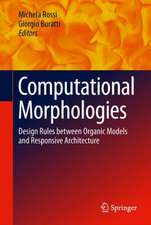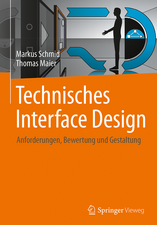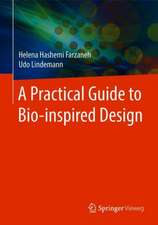Experimental Design Research: Approaches, Perspectives, Applications
Editat de Philip Cash, Tino Stanković, Mario Štorgaen Limba Engleză Hardback – 27 mai 2016
Above all, the book emphasizes the integrative nature of design research in terms of the methods, theories, and units of study—from the individual to the organizational level. Although this approach offers many advantages, it has inherently led to a situation in current research practice where methods are diverging and integration between individual, team and organizational understanding is becoming increasingly tenuous, calling for a multidisciplinary and transdiscipinary perspective. Experimental design research thus offers a powerful tool and platform for resolving these challenges.
Providing an invaluable resource for the design research community, this book paves the way for the next generation of researchers in the field by bridging methods and methodology. As such, it will especially benefit postgraduate students and researchers in design research, as well as engineering designers.
| Toate formatele și edițiile | Preț | Express |
|---|---|---|
| Paperback (1) | 998.34 lei 6-8 săpt. | |
| Springer International Publishing – 30 mai 2018 | 998.34 lei 6-8 săpt. | |
| Hardback (1) | 1004.48 lei 6-8 săpt. | |
| Springer International Publishing – 27 mai 2016 | 1004.48 lei 6-8 săpt. |
Preț: 1004.48 lei
Preț vechi: 1224.98 lei
-18% Nou
Puncte Express: 1507
Preț estimativ în valută:
192.26€ • 199.96$ • 161.11£
192.26€ • 199.96$ • 161.11£
Carte tipărită la comandă
Livrare economică 13-27 martie
Preluare comenzi: 021 569.72.76
Specificații
ISBN-13: 9783319337791
ISBN-10: 3319337793
Pagini: 200
Ilustrații: XII, 270 p. 69 illus., 43 illus. in color.
Dimensiuni: 155 x 235 x 18 mm
Greutate: 0.58 kg
Ediția:1st ed. 2016
Editura: Springer International Publishing
Colecția Springer
Locul publicării:Cham, Switzerland
ISBN-10: 3319337793
Pagini: 200
Ilustrații: XII, 270 p. 69 illus., 43 illus. in color.
Dimensiuni: 155 x 235 x 18 mm
Greutate: 0.58 kg
Ediția:1st ed. 2016
Editura: Springer International Publishing
Colecția Springer
Locul publicării:Cham, Switzerland
Cuprins
An Introduction to Experimental Design Research.- Evaluation of Empirical Design Studies and Metrics.- Quantitative Research Principles and Methods for Human-focused Research in Engineering Design.- Creativity in Individual Design Work.- Methods for Studying Collaborative Design Thinking.- The Integration of Quantitative Biometric Measures and Experimental Design Research.
Textul de pe ultima copertă
This book presents a new, multidisciplinary perspective on and paradigm for integrative experimental design research. It addresses various perspectives on methods, analysis and overall research approach, and how they can be synthesized to advance understanding of design. It explores the foundations of experimental approaches and their utility in this domain, and brings together analytical approaches to promote an integrated understanding. The book also investigates where these approaches lead to and how they link design research more fully with other disciplines (e.g. psychology, cognition, sociology, computer science, management).
Above all, the book emphasizes the integrative nature of design research in terms of the methods, theories, and units of study—from the individual to the organizational level. Although this approach offers many advantages, it has inherently led to a situation in current research practice where methods are diverging and integration between individual, team and organizational understanding is becoming increasingly tenuous, calling for a multidisciplinary and transdiscipinary perspective. Experimental design research thus offers a powerful tool and platform for resolving these challenges.
Providing an invaluable resource for the design research community, this book paves the way for the next generation of researchers in the field by bridging methods and methodology. As such, it will especially benefit postgraduate students and researchers in design research, as well as engineering designers.
Above all, the book emphasizes the integrative nature of design research in terms of the methods, theories, and units of study—from the individual to the organizational level. Although this approach offers many advantages, it has inherently led to a situation in current research practice where methods are diverging and integration between individual, team and organizational understanding is becoming increasingly tenuous, calling for a multidisciplinary and transdiscipinary perspective. Experimental design research thus offers a powerful tool and platform for resolving these challenges.
Providing an invaluable resource for the design research community, this book paves the way for the next generation of researchers in the field by bridging methods and methodology. As such, it will especially benefit postgraduate students and researchers in design research, as well as engineering designers.
Caracteristici
Presents a new paradigm for integrative experimental design research Offers a new perspective and guidance for researchers engaged in design research Paves the way for the next generation of researchers in the field Includes supplementary material: sn.pub/extras







